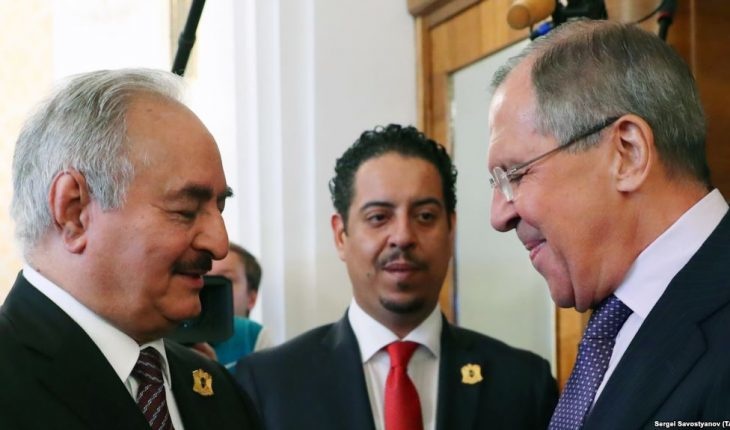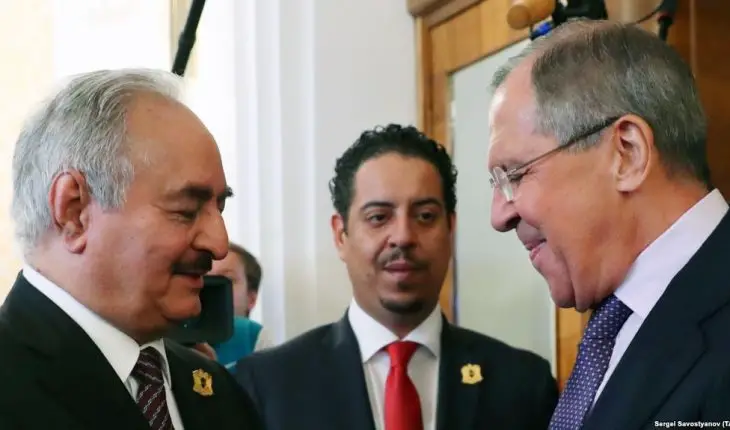
© DR
Thus, after making itself unavoidable in the Syrian conflict and in the Central African Republic crisis, Russia could continue its maneuver of influence while deploying in Libya. Marechal Haftar had been received by Moscow, Italy is satisfied with Russia's support in organizing the conference on Libya in Palermo in November 2018.
The fact that Russia is trying to take advantage of the situation is fine and fair. Russia has strategic interests to invest in Libya. But what appears to be a problem for many analysts, is the method that seems to be used to achieve its goal, especially if the Kremlin does not coordinate as far as partnerships with other Western countries is concerned. Russia could be tempted to play its own way.
If we look at the outcomes in some countries in which Russia has recently deployed its influence, it appears that crises continue to bog down, if not deteriorate.
In Central Africa, Moscow deals with the government and the rebels, seeking its own advantage in each situation, at the risk of partitioning the country.
In Syria, the Kremlin openly supports the regime in place, but it will probably revisit its political option when the fight against the rebels will end, keeping the Syrian president at his post will likely be a casus belli both for internal opponents and the international community.This will again open up an era of uncertainty considering the unity of the country.
Finally, concerning Libya, the likely objective being to grab some of the natural resources, the Russian steamroller will not clutter Western doubts and will quickly and unexpectedly impose on other actors, even if it will be necessary to massively support main armed groups to clean and control key areas.
This situation, far from calming the tensions down, could reinforce the antagonism between the Tripolitania, Cyrenaic and Fezzan who will be keen on taking advantage of this new actor to ensure their survival against the other protagonists. Thus, this method could accelerate the disintegration of Libya and lead, once again, to a consolidated partition of the country which would curl up on three independent regions, held by groups or tribes heavily armed and in permanent struggle in the border regions of their respective areas of interest.
It appears that Moscow, guided by major strategic interests, demonstrates, for some years, in addition to becoming again a key player in the geopolitical and geostrategic global game, has the way and means to impose its own will in the conflict zones, against the will of Libyan and other Nations.
This is very likely to further deteriorate the current crisis, and even worse to expand it.
The fact that Russia is trying to take advantage of the situation is fine and fair. Russia has strategic interests to invest in Libya. But what appears to be a problem for many analysts, is the method that seems to be used to achieve its goal, especially if the Kremlin does not coordinate as far as partnerships with other Western countries is concerned. Russia could be tempted to play its own way.
If we look at the outcomes in some countries in which Russia has recently deployed its influence, it appears that crises continue to bog down, if not deteriorate.
In Central Africa, Moscow deals with the government and the rebels, seeking its own advantage in each situation, at the risk of partitioning the country.
In Syria, the Kremlin openly supports the regime in place, but it will probably revisit its political option when the fight against the rebels will end, keeping the Syrian president at his post will likely be a casus belli both for internal opponents and the international community.This will again open up an era of uncertainty considering the unity of the country.
Finally, concerning Libya, the likely objective being to grab some of the natural resources, the Russian steamroller will not clutter Western doubts and will quickly and unexpectedly impose on other actors, even if it will be necessary to massively support main armed groups to clean and control key areas.
This situation, far from calming the tensions down, could reinforce the antagonism between the Tripolitania, Cyrenaic and Fezzan who will be keen on taking advantage of this new actor to ensure their survival against the other protagonists. Thus, this method could accelerate the disintegration of Libya and lead, once again, to a consolidated partition of the country which would curl up on three independent regions, held by groups or tribes heavily armed and in permanent struggle in the border regions of their respective areas of interest.
It appears that Moscow, guided by major strategic interests, demonstrates, for some years, in addition to becoming again a key player in the geopolitical and geostrategic global game, has the way and means to impose its own will in the conflict zones, against the will of Libyan and other Nations.
This is very likely to further deteriorate the current crisis, and even worse to expand it.
 Menu
Menu
 Libya: Russia is preparing to take the lead in the Libyan crisis
Libya: Russia is preparing to take the lead in the Libyan crisis
















